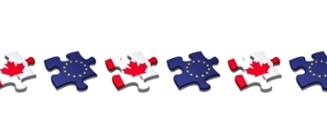EU curriculum for BC schools

Teaching European Integration in British Columbia
The EUCE at UVic - along with the BCSSTA, Capilano University and the UVic European Studies program - sponsored three EU curriculum workshops for BC teachers between 2014 and 2016.
These symposiums were aimed at investigating teaching resources, informational resources, and pedagogical innovations relevant to the study of the European Union, which secondary social studies teachers can integrate into existing curriculum. In addition, the workshops examined opportunities in EU curriculum for simulations and ‘in-‐situ’ learning, and demonstrated how these pedagogical techniques can be effective at facilitating cognitive and affective learning.
Curriculum for BC high schools
An EU Curriculum for BC high schools was developed as a result of this grant and the partnerships therein.
These materials are free for teachers to use in their classrooms and include research links, discussion questions and answer keys and suggested further readings and activities.
1. Welcome!
2. Introduction
a) what is European integration?
b) what is the European Union?
3. Why Study the EU?
a) applicability to students in BC
b) travel and business opportunities
c) market economics and power of EU internationally
d) multiculturalism and diversity
e) globalization
f) decision-making exercises
4. BC Curriculum guide
(also see individual course links below)
7. Teaching the EU: Globalization and the EU
(lesson plan)
8. Teaching the EU: Canada and the EU
a) CETA and the politics of free-trade
b) Canada-Europe relations
c) comparative federal governance
(lesson plan)
9. Teaching the EU: European Immigration Policies
(lesson plan)
10. Teaching the EU: collective decision-making and the Euro
(lesson plan)
11. Post-Secondary programs and opportunities in BC
12. Fun Stuff!
Individual Curricula:
- Socials 10
- Socials 11
- Political Studies 11
- Comparative Cultures 11
- Geography 11
- Genocide Studies 12
- Social Justice 12
- Urban Studies 12
- Law Studies 12
- Economics 12
Symposium: the European union in a world of conflict
This symposium was held at the Vancouver Technical Secondary School, on October 23rd, 2015. The sympoisum explained the evolution of the European Union, and assessed how it has managed the risks or shaped the forces of globalization. Experts explained aspects of European integration, Canada-EU relations, and EU crisis management, and offered pedagogical guidance for incorporating this subject matter into existing curricula. This symposium was part of a major conference, Living in a World of Conflict, hosted by the B.C. Social Studies Teachers Association. The conference attendees – secondary and post-secondary instructors – benefited from focused content on European integration and the European Union, as well as facilitation of curricular development that links Europe to the B.C. secondary curriculum and post-secondary courses. The seminars were facilitated by leading experts on the European Union, including:
- Kurt Huebner (Jean Monnet Chair for European Integration and Director of the Institute for European Studies at the University of British Columbia)
- Valerie D’Erman (Instructor with the Department of Political Science at the University of Victoria)
- Conrad King (Instructor with the Department of Political Studies at Capilano University and Director of the Network for European Studies (Canada))
For more information on the conference, please consult the workshop schedule, and workshop description.
This symposium was made possible through a grant from the European Commission, and with the support of the EUCE at UVic, the Network for European Studies (Canada)the Department of Political Studies, Capilano University, and the BCSSTA.
February 2015 conference info
On February 20th, 2015, the EUCE at UVic hosted a conference on curricular development of EU studies for B.C. educators.
At the conference, experts explained various relevant EU history, politics, economics, and more. The aim of the conference was to provide secondary and post-secondary instructors with the information and resources necessary to further develop EU related curricula.
The powerpoint presentations given by the experts are attached below:
- Conrad King -"Resources for teaching about the EU and European Studies"
- Valerie D'Erman - "Politics and institutions of the EU"
- Ivan Dumka - "The economic and monetary union (EMU)"
- Emmanuel Brunet-Jailly - "The history of the EU"
For more information, please view the conference poster and the conference schedule.
